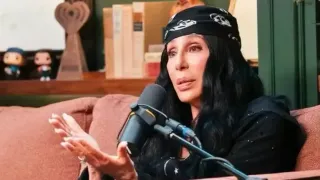November 29, 2022
A Kiki with Herb: Kenny Mellman on Breaking Up and Reuniting with Justin Vivian Bond
Jim Gladstone READ TIME: 4 MIN.
"In retrospect, it had to be a violent end," says Kenny Mellman, recalling the demise of "Kiki and Herb" back in 2007, not long after the locally-formed twosome's last San Francisco performance.
Ever-contentious in the spotlight, the prickly cabaret couple –a sort of bitter salt-cured Steve and Eydie portrayed by Mellman (Herb) and Justin Vivian Bond (Kiki)– also had its share of offstage ups-and-downs, culminating in the high of a Tony-nominated Broadway show followed by a lengthy split that was not patched up until 2016.
Waylaid by a presidency, a pandemic and their own separate projects, the pair finally return to take the stage of the Curran Theatre for one night only on Friday, December 9.
In a recent interview with the Bay Area Reporter, Melman recalled that when they split at the height of their success, "We'd been doing Kiki and Herb for over 15 years at that point. I defy you to come up with a two-person act that doesn't have its flare-ups.
"Still, they won't mind me saying it [Bond uses they/them pronouns], because it's the truth: They ended the act at that point. I wasn't ready to let Kiki and Herb go. We didn't speak to each other for quite some time after."
Introduced by a mutual friend in the 1990s, Mellman and Bond's first regular bookings as Kiki and Herb took place at the Mission's now-defunct Eichelberger's bar. "We took mushrooms before every gig," Mellman recalls.
Those early drug-fueled performances helped the pair develop an act underpinned with AIDS-era fury. Kiki and Herb provided a cranky, creative catharsis that helped both the performers and their audiences get through a nearly incomprehensible period of loss.
Big Apples
The pair moved to New York and further acclaim, but an act forged in flame was perhaps doomed for burnout. Bond felt it first.
In an essay for online publication Talkhouse, Mellman recalled, "I was blindsided when Vivian told me, in front of the Astor Place Starbucks, that V wanted to end Kiki and Herb. It felt to me like that gut-wrenching moment when a lover says they don't love you anymore. It felt completely and undeniably final."
Bond went on to build a solo songwriting and cabaret career that has brought them back to San Francisco on numerous occasions, playing venues including the Castro Theatre, Oasis, and Feinstein's at the Nikko. More recently, they have won international acclaim for a duo act with queer countertenor Anthony Roth Constanzo.
While more laid back than Bond, Mellman has quietly chalked up an impressive record of artistic accomplishment. Along with Kathleen Hanna, whose other bands include Bikini Kill and Le Tigre, he's a founding member of indie rock act The Julie Ruin; and co-creator, with Bridget Everett and "Sex and the City" actor Michael Patrick King, of "At Least Its Pink," Everett's breakthrough cabaret show, the predecessor of her recent HBO series, "Somebody Somewhere."
Mellman dates the beginning of his rapprochement with Bond to the 2013 death of queer theorist José Esteban Munoz at age 46. Munoz' groundbreaking academic work at Duke University and the City University of New York acknowledged the social and political significance of Kiki and Herb to the queer community.
While Mellman and Bond hadn't seen each other in several years, they found themselves together at Munoz' memorial service and, in Kiki and Herb personae, performed the duo's cracked, heartwrenching version of Bonnie Tyler's "Total Eclipse of the Heart."
Sole Asylum
By 2016, in the throes of the Trump-Clinton presidential race, they mounted a full-scale reunion with 22 sold-out performances of "Seeking Asylum!" at Joe's Pub. Just one month after that engagement, the Pulse nightclub massacre took place in Orlando, Florida, prompting a friend of Mellman's to post on Facebook: "I really wish there was a Kiki and Herb show tonight so I could watch two people transform rage into cathartic art."
While on the one hand Mellman acknowledges that "Kiki and Herb is a nostalgia act for our audiences," he also recognizes their unfortunate ongoing utility as a tool for outrage. The Club Q massacre, the overturn of Roe, and the rise of authoritarianism are sure to set the duo's flinty old bones aflame.
Mellman marvels at the air of cultish allure surrounding Kiki and Herb, attributing it to their emergence in the final years before the internet became omnipresent. "Who knows what it would have been like if we'd started ten years later? Most of Kiki and Herb's career took place before there were phones with cameras attached, before drag was a mainstream phenomenon."
Today, says Mellman, he and Bond are close friends once again.
"When we're not in New York, we both have places in the Catskills. I'm pretty much a hermit, but as far as I have a social life, other than with my boyfriend it's as much with Viv as anyone else. There's something very seductive about doing Kiki and Herb together after all this time. It's very fulfilling and comforting. But it's still exhausting. And we're comfortable with each other beyond the act now."
'Kiki and Herb: Do You Hear What We Hear?' Dec. 9. at the Curran Theatre, 445 Geary St. $35-$117. (888) 746-1799. www.sfcurran.com www.broadwaysf.com
Help keep the Bay Area Reporter going in these tough times. To support local, independent, LGBTQ journalism, consider becoming a BAR member.






